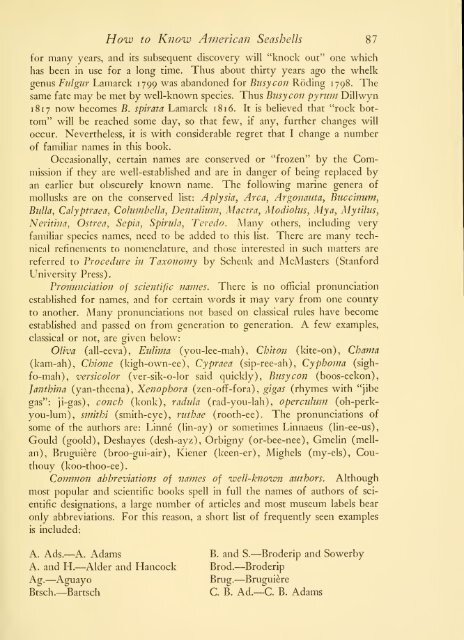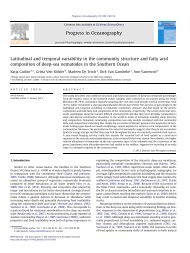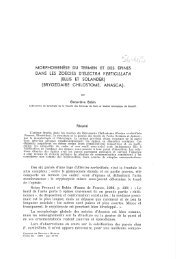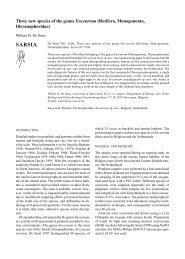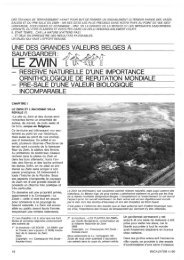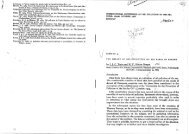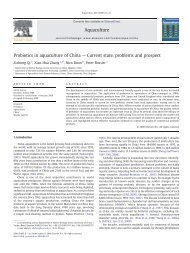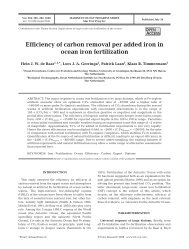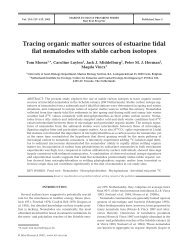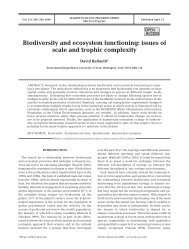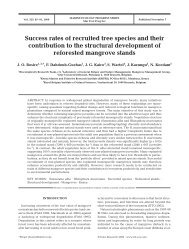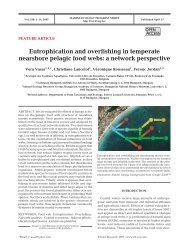- Page 3:
I inch (English) I pouce (French) I
- Page 6 and 7:
THE NEW ILLUSTRATED NATURALIST EDIT
- Page 8 and 9:
NEW YORK D. Van Nostrand Company, I
- Page 11 and 12:
Preface This book wrote itself in r
- Page 13:
Contents CHAPTER PAGE Preface vii L
- Page 16 and 17:
1 xii List of Plates PLATE 2 3 BETW
- Page 18 and 19:
XIV A.AV Foreivord of all of us who
- Page 21 and 22:
CHAPTER I Man and Mollusks Seashell
- Page 23 and 24:
Man and Mollusks 5 Indo-Pacific are
- Page 25 and 26:
Man and Molhisks 7 (Cypraecassis ru
- Page 27 and 28:
Man and Mollusks 9 It was not until
- Page 29 and 30:
Man and Molhisks 11 shell ornaments
- Page 31 and 32:
Man and Mollusks 13 ancients. They
- Page 33 and 34:
Ma7J and Mollusks 15 Sea Snails, ]a
- Page 35 and 36:
Life of the Snails 17 pods. A few s
- Page 37 and 38:
Life of the Snails 19 ma {Smtnia) l
- Page 39 and 40:
Life of the Snails 21 review of the
- Page 41 and 42:
Life of the Snails 23 from which th
- Page 43 and 44:
Life of the Snails 25 sexuality. Du
- Page 45 and 46:
IMASSARIUS Life of the Snails 27 Fi
- Page 47 and 48:
Life of the Snails 29 eggs may deve
- Page 49 and 50:
CHAPTER III Life of the Clams Of th
- Page 51 and 52:
Life of the Clams 3 3 book and, by
- Page 53 and 54: Life of the Cla?ns HOW THEY FEED No
- Page 55 and 56: Life of the Cla?ns 37 Lying close t
- Page 57 and 58: Life of the Cla?ns 39 A certain amo
- Page 59 and 60: Life of the Clams 41 the eggs are f
- Page 61 and 62: Life of the Clams 43 HOW THEY SENSE
- Page 63 and 64: Life of the Clams 45 the scallops.
- Page 65 and 66: Lives of the Other Mollusks 47 crip
- Page 67 and 68: Lives of the Other Mollusks 49 freq
- Page 69 and 70: Lives of the Other Molliisks 51 now
- Page 71 and 72: Lives of the Other Mollusks 53 spec
- Page 73 and 74: Lives of the Other Mollusks 55 micr
- Page 75 and 76: Collecting American Seashells SI It
- Page 77 and 78: Collecting A7nerican Seashells 59 s
- Page 79 and 80: CollecMg American Seashells 61 grav
- Page 81 and 82: Collecting American Seashells 63 va
- Page 83 and 84: Collecting American Seashells 65 eq
- Page 85 and 86: Collectifig American Seashells 61 o
- Page 87 and 88: Collecting American Seash ells 69 A
- Page 89 and 90: Honjo to Know American Seashells 71
- Page 91 and 92: How to Know American Seashells 73 F
- Page 93 and 94: Honv to Know Ajjierican Seash ells
- Page 95 and 96: Hoiv to Know American Seashells 77
- Page 97 and 98: How to Knouo American Seashells 79
- Page 99 and 100: Honjo to K?iow American Seashells 8
- Page 101 and 102: HouD to Know Aiiiericmi Seashells 8
- Page 103: Houo to Know Afjierican Seashells 8
- Page 107: PART II Guide to the American Seash
- Page 110 and 111: 92 America?! Seash ells Gulf of Mex
- Page 112 and 113: 94 American Seashells Haliotis kamt
- Page 114 and 115: 96 American Seashells Puncturella c
- Page 116 and 117: 98 Ainerican Seash ells Diodora mur
- Page 118 and 119: 100 American Seashells Subfamily FI
- Page 120 and 121: 102 American Seashells Subgenus Col
- Page 122 and 123: 104 American Seashells I % inch in
- Page 124 and 125: 106 American Seashells Acmaea antil
- Page 126 and 127: 108 American Seash ells Margarites
- Page 128 and 129: 1 10 American Seashells Subgenus Ca
- Page 130 and 131: 112 American Seash ells Subfamily C
- Page 132 and 133: 114 American Seashells Figure 33. V
- Page 134: Plate 2 PACIFIC COAST ABALONES a. R
- Page 138: Plate 4 NERITES, PURPLE SEA-SNAILS,
- Page 142: Plate 6 COWRIES a. Atlantic Yellow
- Page 146 and 147: Plate 8 Living Flamingo Tongues on
- Page 148: Plate 9 BONNETS, TUNS AND FROG-SHEL
- Page 152: Plate 1 SPINDLES, DWARF OLIVES AND
- Page 156:
Plate 13 ATLANTIC TULIPS, SPINDLES
- Page 160 and 161:
Plate 15 NEW ENGLAND NUDIBRANCHS a.
- Page 162 and 163:
Plate 16 PACIFIC COAST NIIDIBRANCHS
- Page 165 and 166:
TROCHIDAE 115 % to I Inch in length
- Page 167 and 168:
TROCHIDAE 117 Indies, Although fair
- Page 169 and 170:
TROCHIDAE 119 T. hotessierana Orbig
- Page 171 and 172:
TURBINIDAE 121 should be considered
- Page 173 and 174:
TURBINIDAE 12 3 Arene variabilis Da
- Page 175 and 176:
TURBINIDAE Ventura, California, to
- Page 177 and 178:
PHASIANELLIDAE 1 2 7 Lower Florida
- Page 179 and 180:
NERITIDAE 129 Nerita fulgurans Gmel
- Page 181 and 182:
LITTORINIDAE 131 Shell smooth excep
- Page 183 and 184:
LITTORINIDAE 13 3 Littorina angulif
- Page 185 and 186:
RISSOIDAE US 34 to 1 inch in length
- Page 187 and 188:
RISSOIDAE 137 C. Interspaces with s
- Page 189 and 190:
VITRINELLIDAE 139 Vs inch in diamet
- Page 191 and 192:
TURRITELLIDAE 141 but usually has s
- Page 193 and 194:
VERMETIDAE 143 heavily beaded, spir
- Page 195 and 196:
CAECIDAE 145 not the common West Fl
- Page 197 and 198:
CAECIDAE 147 3.0 mm. in length by i
- Page 199 and 200:
CAECIDAE 149 shell, cutting across
- Page 201 and 202:
POTAMIDIDAE 151 the outside of the
- Page 203 and 204:
CERITHIIDAE 15 3 2 yellowish white,
- Page 205 and 206:
CERITHIIDAE 155 % to /4 inch in len
- Page 207 and 208:
CERITHIIDAE 157 %6 to % inch in len
- Page 209 and 210:
TRIPHORIDAE 159 cords or threads. A
- Page 211 and 212:
EPITONIIDAE 161 be opisthobranchs a
- Page 213 and 214:
EPITONIIDAE 163 Vo X.0 % inch in le
- Page 215 and 216:
HIPPONICIDAE 165 % to % inch in len
- Page 217 and 218:
TRICHOTROPIDAE 167 is white in colo
- Page 219 and 220:
CALYPTRAEIDAE 169 I % inches in dia
- Page 221 and 222:
CALYPTRAEIDAE 171 Variable in shape
- Page 223 and 224:
STROMBIDAE 17 3 "It is generally ad
- Page 225 and 226:
LAMELLARIIDAE 175 Strombus ranimis
- Page 227 and 228:
ERATOIDAE 177 ^ inch in length, res
- Page 229 and 230:
ERATOIDAE 179 Trivia 7tix Schilder
- Page 231 and 232:
CYPRAEIDAE 181 Cypraea mus Linne (p
- Page 233 and 234:
OVULIDAE 183 Neosimnia avena Sowerb
- Page 235 and 236:
NATICIDAE 185 ^ inch in diameter, p
- Page 237 and 238:
NATICIDAE 187 Subgenus Glossaulax P
- Page 239 and 240:
NATICIDAE 189 Genus Lunatia Gray 18
- Page 241 and 242:
NATICIDAE 191 Subjainily NATICINAE
- Page 243 and 244:
CASSIDIDAE 193 1% to 3 inches in le
- Page 245 and 246:
CYMATIIDAE 195 enamel-white. Enamel
- Page 247 and 248:
BURSIDAE 197 % to 2^2 inches in len
- Page 249 and 250:
TONNIDAE 199 Subgenus Crossata Jous
- Page 251 and 252:
MURICIDAE 201 3 inches in length, w
- Page 253 and 254:
MURIGIDAE 203 Outer lip crenulate a
- Page 255 and 256:
MURICIDAE 205 completely. A deep wa
- Page 257 and 258:
MURIGIDAE 207 described, and we hav
- Page 259 and 260:
MURICIDAE 209 1% to 2 inches in len
- Page 262:
a. KEYHOLE LIMPET, Megathura crenu-
- Page 266:
a. ERODED PERIWINKLE, Littorina pla
- Page 270:
a. LAMELLOSE WENTLETRAP, Epitonium
- Page 274:
TWO-KEELED HAIRY-SHELL, Tiicliotrop
- Page 278:
a. SULCATE MITER, Mitra sulcata Gme
- Page 282:
a. COMMON EASTERN OYSTER, Crasso- s
- Page 286:
BROAD-RIBBED CARDITA, Cardita flori
- Page 290 and 291:
a. GIANT ATLANTIC COCKLE, Dbwcardiu
- Page 293 and 294:
MURICIDAE 211 Muricopsis ostrearum
- Page 295 and 296:
MURICIDAE 213 Urosalpinx tampaensis
- Page 297 and 298:
MURICIDAE 215 with rounded, spiral
- Page 299 and 300:
MURICIDAE 217 often fimbriated axia
- Page 301 and 302:
MAGILIDAE 219 Aperture white. Exter
- Page 303 and 304:
COLUMBELLIDAE 221 Genus Anachis H.
- Page 305 and 306:
COLUMBELLIDAE 22 3 gausapata Gould
- Page 307 and 308:
BUCCINIDAE 225 a much higher spire,
- Page 309 and 310:
BUCCINIDAE 111 3 to 4 inches in len
- Page 311 and 312:
BUCCINIDAE 229 Colus pubescens Verr
- Page 313 and 314:
BUCCINIDAE 231 Subgenus Sulcosipho
- Page 315 and 316:
BUCCINIDAE 23 3 Former distinct var
- Page 317 and 318:
MELONGENIDAE 235 Melongena corona p
- Page 319 and 320:
NASSARIIDAE 237 part of the Gulf of
- Page 321 and 322:
NASSARIIDAE 2 39 Subgenus Hinia Gra
- Page 323 and 324:
FASCIOLARIIDAE 241 iVi inches in le
- Page 325 and 326:
FASCIOLARIIDAE 243 Subfa?nily FUSIN
- Page 327 and 328:
OLIVIDAE 245 7 to 14 inches in leng
- Page 329 and 330:
OLIVIDAE 247 % inch in length, apex
- Page 331 and 332:
MITRIDAE 249 in color. lo whorls. C
- Page 333 and 334:
VOLUTIDAE 251 Subgenus Aurinia H. a
- Page 335 and 336:
CANCELLARIIDAE 2 5 3 Genus Narona H
- Page 337 and 338:
Figure 56. Marginellas. a, Marginel
- Page 339 and 340:
MARGINELLIDAE 257 Prunu77t apicimw7
- Page 341 and 342:
MARGINELLIDAE 2 59 % inch in length
- Page 343 and 344:
CONIDAE 261 brown dots sometimes pr
- Page 345 and 346:
CONIDAE 263 % to % inch in length;
- Page 347 and 348:
TEREBRIDAE 265 Conus californiciis
- Page 349 and 350:
TURRIDAE 267 Terebra salleana Desha
- Page 351 and 352:
Figure 57. American Turret and Mang
- Page 353 and 354:
TURRIDAE 271 brown with a white ban
- Page 355 and 356:
TURRIDAE 27 3 Siibjainily BORSONIIN
- Page 357 and 358:
ACTEONIDAE 275 5 mm. in length; bod
- Page 359 and 360:
BULLIDAE 277 Fa7mly DIAPHANIDAE Gen
- Page 361 and 362:
ATYDAE 279 Genus Haminoea Turton an
- Page 363 and 364:
ACTEOCINIDAE 281 3 to 4 mm. in leng
- Page 365 and 366:
GASTROPTERIDAE 2 8 3 mantle reflexe
- Page 367 and 368:
APLYSIDAE 285 G. pacificu77i Bergh
- Page 369 and 370:
PLEUROBRANCHIDAE 287 ish. Gill plum
- Page 371 and 372:
PYRAMIDELLIDAE 289 to the host by m
- Page 373 and 374:
PYRAMIDELLIDAE 291 Figure 63. Pacif
- Page 375 and 376:
PERACLIDAE 293 Spiratella lesueuri
- Page 377 and 378:
CAVOLINIDAE 295 8 mm. in length, co
- Page 379 and 380:
PTEROPODA 297 FiGURK 64. F.xplanati
- Page 381 and 382:
DORIDAE 299 stricted. There is only
- Page 383 and 384:
DORIDAE 301 rate, retractile branch
- Page 385 and 386:
DENDRODORIDIDAE 303 minute, compres
- Page 387 and 388:
ONCHIDORIDAE 305 2 to 3 inches in l
- Page 389 and 390:
DENDRONOTIDAE 307 Ancula pacifica M
- Page 391 and 392:
FLABELLINIDAE 309 to 4. Radula of 8
- Page 393 and 394:
SIPHONARIIDAE 311 Figure 65. Atlant
- Page 395 and 396:
With tiny, granular scales: LEPIDOC
- Page 397 and 398:
MOPALIIDAE 315 Family MOPALIIDAE Ge
- Page 399 and 400:
CRYPTOPLACIDAE 317 center of each v
- Page 401 and 402:
ISCHNOCHITONIDAE 319 fly-shaped val
- Page 403 and 404:
ISCHNOCHITONIDAE 3 2 % to /4 inch i
- Page 405 and 406:
ISCHNOCHITONIDAE 3 2 3 I to 1V2 inc
- Page 407 and 408:
CHITONIDAE 325 Chiton squa?7tosiis
- Page 409 and 410:
CHAPTER IX Dentaliums and Other Tus
- Page 411 and 412:
Dentalium texasianum Philippi North
- Page 413 and 414:
DENTALIIDAE 331 Subgenus Graptacme
- Page 415 and 416:
SOLEMYACIDAE 33 3 Order PALAEOCONCH
- Page 417 and 418:
NUCULIDAE 3 35 Nucula atacellana Sc
- Page 419 and 420:
NUCULANIDAE 337 valves). Concentric
- Page 421 and 422:
NUCULANIDAE 3 39 About H to % inch
- Page 423 and 424:
ARCIDAE 341 1% to 2 inches in lengt
- Page 425 and 426:
ARCIDAE 343 ment moderately develop
- Page 427 and 428:
ARCIDAE 345 2/4 to 5 inches in leng
- Page 429 and 430:
LIMOPSIDAE 347 angular. Mostly deep
- Page 431 and 432:
MYTILIDAE 349 Glycymeris americana
- Page 433 and 434:
MYTILIDAE 351 Crenella columbiana D
- Page 435 and 436:
MYTILIDAE 35 3 purplish and white.
- Page 437 and 438:
MYTILIDAE 355 siphon and behind int
- Page 439 and 440:
MYTILIDAE 357 with strong, vertical
- Page 441 and 442:
FINNIDAE 359 Family PTERIIDAE Genus
- Page 443 and 444:
PECTINIDAE 361 row, elongate chondr
- Page 445 and 446:
PECTINIDAE 363 Pecten tereinus Dall
- Page 447 and 448:
PECTINIDAE 365 secondary rib in bet
- Page 449 and 450:
PECTINIDAE 367 margin of the valve.
- Page 451 and 452:
SPONDYLIDAE 369 are attached to roc
- Page 453 and 454:
ANOMIIDAE 371 I to 3 inches in heig
- Page 455 and 456:
OSTREIDAE 37 3 similar to the Pacif
- Page 457 and 458:
ASTARTIDAE 375 Crassostrea virginic
- Page 459 and 460:
CRASSA TELLIDAE 3 7 7 adjacent and
- Page 461 and 462:
CARDITIDAE 379 each other, located
- Page 463 and 464:
ARCTICIDAE 381 shells are smooth an
- Page 465 and 466:
DIPLODONTIDAE 383 Superjamily LUCIN
- Page 467 and 468:
LUCINIDAE 385 monly with a thin, ye
- Page 469 and 470:
LUCINIDAE 387 thick-shelled, white,
- Page 471 and 472:
LUCINIDAE 389 The subspecies centri
- Page 473 and 474:
CHAMIDAE 391 I to I K Inches In len
- Page 475 and 476:
CHAMIDAE 393 of the valves. The paU
- Page 477 and 478:
LEPTONIDAE 395 Lasaea cistula Keen
- Page 479 and 480:
CARDIIDAE 397 a single specimen, is
- Page 481 and 482:
CARDIIDAE 399 I to 2 inches in size
- Page 483 and 484:
CARDIIDAE 401 Exterior orange-yello
- Page 486 and 487:
Plate 34 SMALL SCALLOPS a. Sentis S
- Page 488:
Plate 35 PEARL OYSTERS AND MUSSELS
- Page 492:
Plate 37 JEWEL BOXES a. Clear Jewel
- Page 496:
Plate 39 VENUS CLAMS AND COCKLES a.
- Page 501 and 502:
CARD]IDAE 403 round and slightly ga
- Page 503 and 504:
VENERIDAE 405 1% inches in length,
- Page 505 and 506:
VENERIDAE 407 Genus Chione Miihlfel
- Page 507 and 508:
VENERIDAE 409 % to % inch in length
- Page 509 and 510:
VENERIDAE 411 1% to 2 inches in len
- Page 511 and 512:
VENERIDAE 413 ^ to % inch in length
- Page 513 and 514:
VENERIDAE 415 more distinct concent
- Page 515 and 516:
VENERIDAE 417 storms between Seal B
- Page 517 and 518:
PETRICOLIDAE 419 Color whitish to t
- Page 519 and 520:
TELLINIDAE 421 pointed and slightly
- Page 521 and 522:
TELLINIDAE 423 Schrank 1803 nor Lea
- Page 523 and 524:
Tellina modesta Carpenter TELLINIDA
- Page 525 and 526:
TELLINIDAE 427 Tellina iris Say Iri
- Page 527 and 528:
TELLINIDAE 429 the pallial sinus ru
- Page 529 and 530:
TELLINIDAE 4^1 centric sculpture of
- Page 531 and 532:
TELLINIDAE 43 3 Macoma yoldijormis
- Page 533 and 534:
SEMELIDAE 435 Semele pwpiirascens G
- Page 535 and 536:
DONACIDAE 437 A bra aequalis Say Co
- Page 537 and 538:
SANGUINOLARIIDAE 439 a purple flush
- Page 539 and 540:
SANGUINOLARllDAE 441 obscure) runni
- Page 541 and 542:
SOLENIDAE 443 5 to 6 inches in leng
- Page 543 and 544:
MACTRIDAE 445 coarse, concentric, i
- Page 545 and 546:
MACTRIDAE 447 end smaller than the
- Page 547 and 548:
MACTRIDAE 449 Genus Miilinia Gray 1
- Page 549 and 550:
MESODESMATIDAE 451 Figure 91. Rangi
- Page 551 and 552:
HIATELLIDAE 45 3 the dorsal and ven
- Page 553 and 554:
MYACIDAE 455 My a arenaria Linne So
- Page 555 and 556:
CORBULIDAE 457 % of an inch in leng
- Page 557 and 558:
GASTROCHAENIDAE 459 dull white with
- Page 559 and 560:
PHOLADIDAE 461 the valves. No scien
- Page 561 and 562:
PHOLADIDAE 463 which is supported b
- Page 563 and 564:
TEREDINIDAE 465 % to I ^ inches in
- Page 565 and 566:
TEREDINIDAE 467 Pallets about Vs in
- Page 567 and 568:
PANDORIDAE 469 ally compressed. Out
- Page 569 and 570:
THRACIIDAE 471 I inch in length, th
- Page 571 and 572:
PERIPLOA4A TIDAE 47 3 in a ventral
- Page 573 and 574:
CUSPIDARIIDAE 475 entire surface of
- Page 575 and 576:
CUSPIDARIIDAE 477 Cardio7nya pectin
- Page 577 and 578:
SEPIOLIDAE 479 The rather fragile,
- Page 579 and 580:
LOLIGINIDAE 481 Figure 99. Atlantic
- Page 581 and 582:
OMMASTREPHIDAE 48 3 Genus Doryteuth
- Page 583 and 584:
OCTOPODIDAE 485 Family ARGONAUTIDAE
- Page 585 and 586:
OCTOPODIDAE 487 under large rocks a
- Page 587 and 588:
W OCTOPODIDAE 489 Aside from egg-si
- Page 589 and 590:
Guide to the Molluscmi Literature 4
- Page 591 and 592:
Guide to the Molliiscan Literature
- Page 593 and 594:
Guide to the Molluscan Literature 4
- Page 595 and 596:
Guide to the Molluscan Literature 4
- Page 597 and 598:
Guide to the Molluscan Literature 4
- Page 599 and 600:
Guide to the Molhiscan Literature 5
- Page 601 and 602:
Guide to the Molhiscan Literature 5
- Page 603 and 604:
Index to Subject Matter and Common
- Page 605 and 606:
Carinate Dove-shell, 222 Carinate L
- Page 607 and 608:
I Flat Moon Shell, see Common Baby'
- Page 609 and 610:
I- 1 Lunar Dove-shell, 223, pi. 25g
- Page 611 and 612:
Rattle Shell, see Blackberry Drupe,
- Page 613:
Do^^ Fryon's Scallop, 366, pi. 33a
- Page 616 and 617:
518 Agriodesma, 469 Agriopoma, 416
- Page 618 and 619:
520 bitruncata, Panope, 454 Bittium
- Page 620 and 621:
522 cepio, Pododesmus, 572 Cerastod
- Page 622 and 623:
524 Index cucuUata, Puncturella, 96
- Page 624 and 625:
526 Fartulum, 149 fasciata, Tegula,
- Page 626 and 627:
528 rugosa, 453 striata, 453, fig.
- Page 628 and 629:
530 fenestrata, 122, pi. i8u lirata
- Page 630 and 631:
532 petri, 205 pomum, 202, pi. lo-l
- Page 632 and 633:
534 Paleoconcha, 332, 333 pallasi,
- Page 634 and 635:
536 Pteriidae, 359 Pteropoda, 292 P
- Page 636 and 637:
538 weyssei, 130 miithi, Boreotroph
- Page 638 and 639:
540 haemastoma haysae, 213 imbricat
- Page 641:
I I


